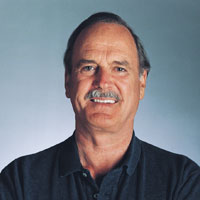Comedy, According to Cleese
Filed Under Print
 John Cleese’s recent announcement that he’s retiring to focus on teaching comedy to the next generation got me thinking about what kind of a teacher Cleese would be. He’s obviously has a lot to impart but what will his book on comedy history be like? What’s the core of Cleese’s Comedy 101?
John Cleese’s recent announcement that he’s retiring to focus on teaching comedy to the next generation got me thinking about what kind of a teacher Cleese would be. He’s obviously has a lot to impart but what will his book on comedy history be like? What’s the core of Cleese’s Comedy 101?
One of my favorite books on comedy is, in fact, not a full book at all. But rather 17 pages from a psychology book Cleese co-wrote with Dr. Robyn Skinner entitled Life, and How to Survive It. The book unfolds as a conversation between the two and in the course of their discussion on laughter they touch on a variety of works, including, surprising to me, Charles Darwin. Darwin apparently thought laughter was caused by being in a situation that forced two contradictory postures or emotions, with the tension of attempting to hold them both exploding into the tell-tale rapid exhalation of air through the vocal cords.
The theory that Cleese finds most useful was from the French philosopher Henri Bergson and his book Laughter. Bergson says:
Laughter is a social sanction against inflexible behavior, which requires a momentary anaestheia of the heart.
Cleese proceeds to break this down and his description of the first part of the phrase on “inflexible behavior’ I found particularly revelatory. The idea is basically this: when a person holds a particular point of view longer than it’s appropriate to hold it - approaching the situation mechanically rather than flexibly - there’s potential for humor. Cleese illustrates the idea with Jack Benny’s “Your money or your life” sketch, where cheapness is the attitude retained for too long. And you get insight into how it’s shaped his own work, with mentions of how inflexible behavior played a role in both Fawlty Towers and A Fish Called Wanda
.
He continues with Bergson from there, sharing how our sympathies with comedic character have to disappear for a seconds and touching on humor uniting/dividing qualities. In some ways, Skinner and Cleese arrive at a grand unified theory of funny. It’s impressive stuff and it’s on pages 71-87 of the hardcover edition, in case you’re browsing a bookstore and want to give a quick read.
As for experiencing the former Python’s teachings first hand, Elephant Larry‘s Alex Zalben once took a course with Cleese while attending Cornell. He told me:
When we took a master class with Mr. Cleese, his tweaks and edits were tiny little pieces of directing and switching of words that made the sketch we were performing infinitely better. It was little tiny things like having an employee character drop a pen at a certain point, so that when they get called on by the boss character, you can do more of a take, emphasize the line in a different way, and take something that was just a regular plot beat in the sketch, and turn it into a huge laugh line.
When someone brings in a sketch, and all it needs is a few minor tweaks, or some playing with on stage, we still tell each other, “You just have to Cleese it up a little bit.”
So even with the short time we spent with him, he made a major impact, and taught us an incredible amount.
For those who can’t experience his insights first hand like Alex has, I hope John Cleese does expand those 17 pages into something that’s illuminating about both humor as well as the man himself, possibly the greatest humor mind of his generation.

The retirement of John Cleese is a double-edged sword - I’m devastated to see him go, yet overjoyed that he will be using his time to teach others. I don’t imagine there is a single person working in comedy these days who hasn’t been influenced by him in some way, and it is gratifying to see that his brilliance will carry on.
The Robscenity,
PHCRadio.com